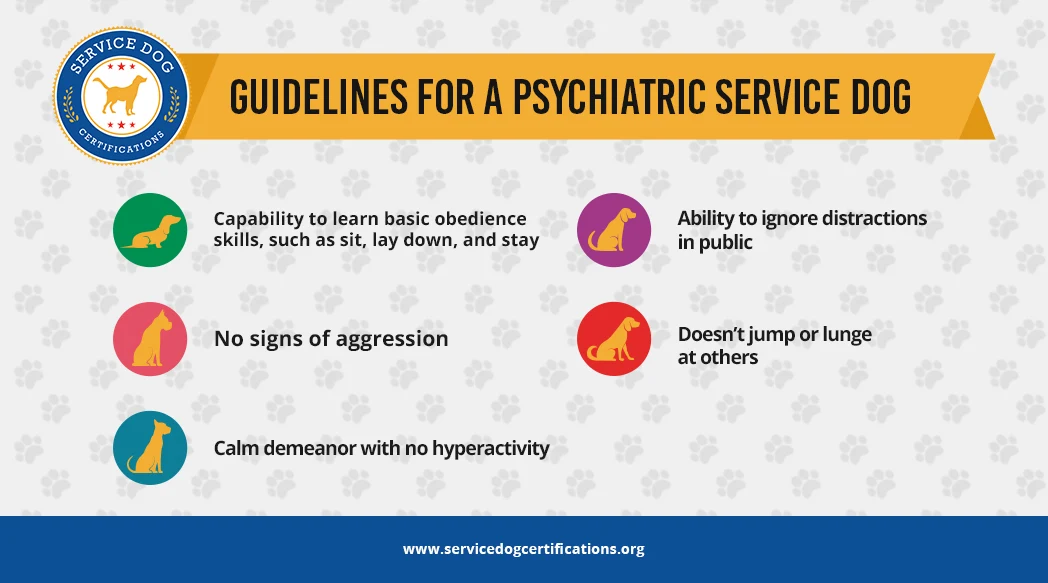Home Page › Blog › How to Get a Psychiatric Service Dog in Florida
How to Get a Psychiatric Service Dog in Florida

If you suffer from anxiety, PTSD, depression, or other psychiatric disabilities, experts say a service dog could help. We all know that pups make us happier with their tail wags and slobbery kisses, but they can also be trained to carry out tasks that make everyday life easier—or perform life-saving tasks when we need them the most.
What is a Psychiatric Service Dog?
A psychiatric service dog (PSD) is a type of service dog trained to perform a specific task to help a person with a psychiatric condition. They have the same rights as service dogs that perform tasks for the physically disabled. To qualify for the aid of a PSD, a person must have a psychiatric disability that can be assisted by tasks performed by a trained dog.
PSDs can be trained by a professional organization or by the handler on their own. It’s important to note that only dogs can serve as psychiatric service animals under the Americans with Disabilities Act (ADA).
Psychiatric service dogs and emotional support animals, what’s the difference?
The main difference between an emotional support animal and a psychiatric service dog is that PSDs are trained to perform tasks relating to the handler’s disability. ESAs, on the other hand, do not need any specialized training — the mere presence of an ESA brings comfort to their owner.
ESAs also do not have legal rights under the ADA. The ADA allows PSDs to enter public areas like stores. PSDs can also board flights and travel with their handlers under the Department of Transportation’s (DOT) rules.
ESAs are not allowed in public spaces that prohibit pets, but they have housing rights under the Fair Housing Act. Both PSDs and ESAs are allowed to live in no-pets buildings without any charge.
The ADA gives the following example of a service dog versus an ESA: If the dog has been trained to sense that an anxiety attack is about to happen and takes a specific action to help avoid the attack or lessen its impact, that would qualify as a service animal. But, if the mere presence of the dog provides comfort with no additional trained actions, that’s an ESA.
It’s important to be aware of the difference between ESAs and PSDs. There is frequent confusion between the two, but you never want to pass off your ESA as a PSD. It’s unethical, and in Florida, it’s illegal to misrepresent an ESA as a service animal.
What tasks can psychiatric service dogs do?
The benefit of a PSD is their training to complete important tasks, from everyday needs to life-saving emergencies. Everyone’s needs vary greatly, but PSDs can perform the following:
- Engage in attention-seeking behaviors, such as nudging, pawing, licking, or tugging on the person’s clothes, any time the person unconsciously starts self-harming behaviors, has an emotional overload, or zones out into a flashback.
- Reduce the potential impact of triggers when in public. The PSD can be trained to place their body in front or behind their person anytime they stop, keeping strangers at a safer distance.
- Provide tactile stimulation.
- Facilitate social interactions and reduce fears associated with being around people.
- Wake up a person having nightmares.
- Get medication and water when the person cannot.
- Provide balance assistance.
- Remind a person to take medication and nag until it’s done.

What Rights Do Psychiatric Service Dogs And Their Handlers Have?
Owners of PSD have rights protected by laws like the Americans with Disabilities Act (ADA), Fair Housing Act (FHA), and Air Carrier Access Act (ACAA). Unfortunately, the ADA doesn’t provide PSD rights to service dogs still in training. But, this rule is different from state to state. Lucky for those in Florida, the state grants dogs-in-training full PSD rights when accompanied by their handler.
There are no breed restrictions for service dogs, so no establishment can deny service dog rights based on the size or breed of your dog. And, no person has the right to ask that you demonstrate a task, provide service dog documentation, or disclose information about your disability. Per the ADA, if a business needs to verify that your dog is a service dog, they may ask two questions:
- Is the dog a service animal required because of a disability?
- What work or task has the dog been trained to perform?
Service dog accessories like certificates, registrations, and ID cards are always optional. While these items are frequently used by service dog owners and can be helpful, they can never be required by third parties.
Equal Housing. A landlord cannot make you pay extra to live with your service dog. As with public spaces, you are liable for any damages your service animal may cause to anyone else or the property.
Public Access. You and your PSD have the right to be in all areas of accommodations that the public or customers are normally permitted to occupy. If the public accommodation typically charges a pet fee or deposit, PSDs are not subject to this fee.
Transportation: Planes, Trains, and Cars. You and your PSD have the right to access transportation, including rideshares, without an extra fee. Before traveling with your PSD by plane, contact the airline to ask if they require Deportment of Transportation service animal forms. Airlines may require:
- U.S. DOT form attesting to the animal’s health, behavior, and training; and
- U.S. DOT form attesting that the animal can either not relieve itself or can relieve itself in a sanitary manner, if the animal will be on a flight that is 8 or more hours.
If you’re wondering what happens if you’re denied rights because of your service dog, you’d be right to think the law has your back. In Florida, handlers have won cases for being denied access to public events and fair housing. In many cases, the handlers were wrongly told that they must supply medical and service dog documentation.
How Do I Get a Psychiatric Service Dog Letter?
A psychiatric service dog letter, or PSD letter, is a letter from a licensed healthcare professional such as a doctor or therapist. A PSD letter states whether the healthcare professional believes you have a mental health disability that qualifies under the ADA for a psychiatric service dog.
PSD letters are obtained by owners to document their health-related needs for their service dog. Third parties cannot demand that you show a PSD letter as a condition for entry or accommodation. Your current doctor or therapist can help you with getting a PSD letter.
You can also seek the help of an online provider for PSD letters. Remote therapists and doctors can assess your mental health and give you a signed PSD letter if you qualify.
Where Can I Get a Psychiatric Service Dog in Florida?
There are a number of organizations in Florida that can help with training and sourcing service dogs. Below are a few examples.
- Dogs for Life
- New Horizons Service Dogs
- K9s for Warriors
- Southeastern Guide Dogs
- Canine Companions for Independence
Purchasing a fully trained service dog can be prohibitively expensive for many people. Fortunately, for lower-income and capable handlers, ADA rules allow PSD owners to train their dogs themselves. Many service dog owners have the ability to train their PSDs themselves and have successfully done so.
You do not need the help of any organization to train a service dog, but it is strongly recommended if you have minimal experience in training animals. It’s important to be honest about your skills as a trainer and the capabilities of your dog.
How do I find the right PSD for me?
Selecting a PSD for your needs is a highly personal decision. While some might think of Golden Retrievers and Labs as the traditional types of service dogs, a PSD can be any breed you like. In Florida, a dog could be bred to be a service dog, rescued, or you can train an existing pup to be your PSD.
The important thing is that the dog has the proper temperament and ability to become a trained service dog. The personal connection you have with a particular dog should not be underappreciated — the bond between a PSD and their owner is like no other relationship.
About the Author: The writing team at Service Dog Certifications is made up of folks who really know their stuff when it comes to disability laws and assistance animals. Many of our writers and editors have service dogs themselves and share insights from their own experiences. All of us have a passion for disability rights and animals.
Latest Posts

The Fair Housing Act Explained for Assistance Animal Owners
The Fair Housing Act (FHA) is a federal law in the United States that prohibits discrimination against people who need a support animal for their physical or mental health. The FHA applies to landlords in all 50 states. Under the Fair Housing Act, if you need a service dog or an emotional support animal, your […]

Read More

How a Service Dog Knows When It’s Time For You to Take Medicine
Service dogs can help their handlers by reminding them to take medication. These highly trained dogs know when it’s time for their handler to take medicine through routine recognition, alarm responses, scent detection, and awareness of physical and behavioral cues. Training a service dog to do this is one of the many service dog tasks […]

Read More

The Ultimate Guide to Service Dog Tasks: A Comprehensive List by Disability
Service dogs are remarkable animals trained to assist individuals with disabilities by performing various tasks. According to the Americans with Disabilities Act (ADA), a dog can become a service dog if it has been trained to perform a task that helps with the handler’s health condition. Service dogs can help with physical disabilities as well […]

Read More







